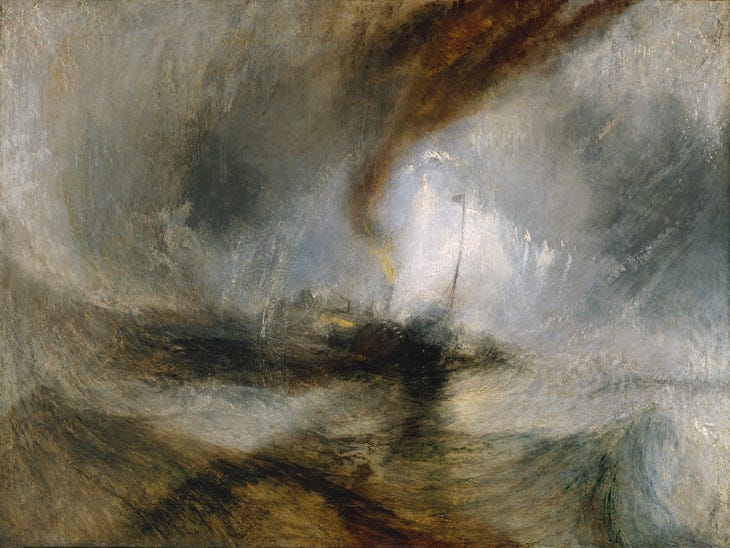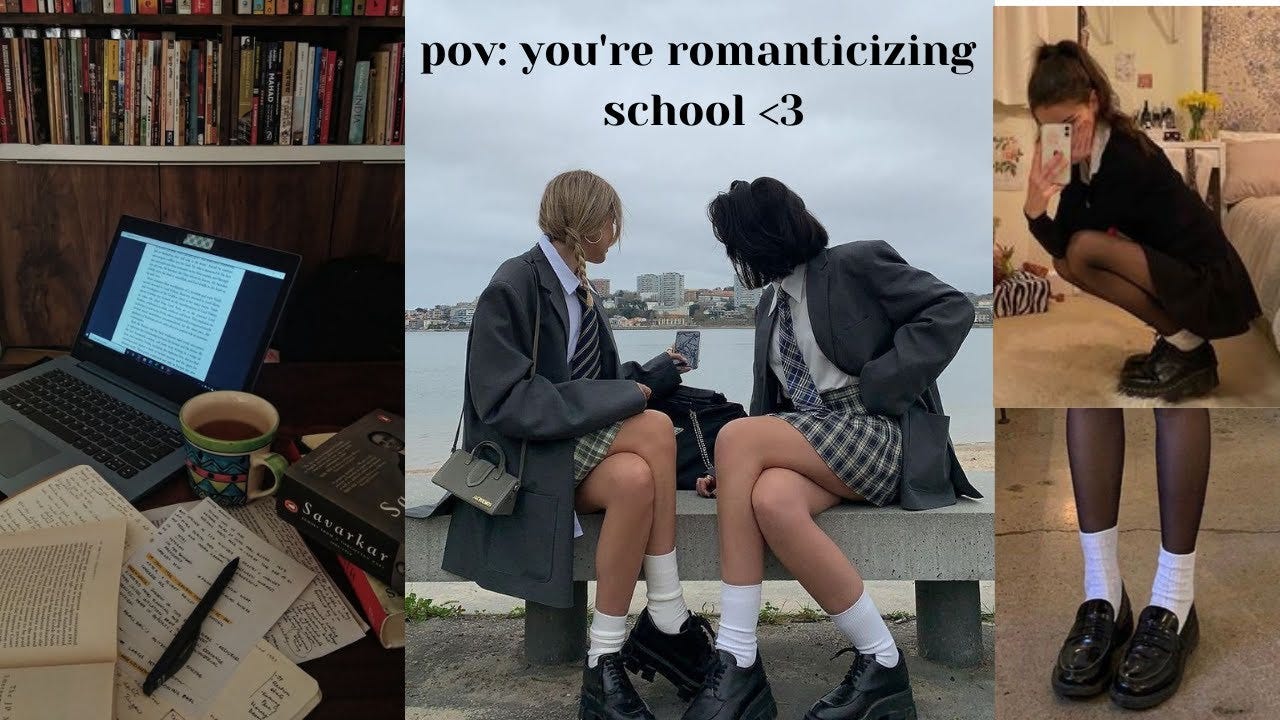What Does It Mean to Romanticize?
And What Makes Oversharing Unromantic?
For a long time, humans have taken an interest in the “romantic.” And I’m not just talking about romantic love (although Romeo and Juliet was published in 1595). I’m talking more about the ideas cultivated during the Romantic era of eighteenth-century Europe. Partially in reaction to the Industrial Revolution and the newfound doctrines of Enlightenment, Romanticism was an artistic and intellectual movement characterized by its emphasis on emotion and the idealization of nature. The period was all about feeling. Artists poured their hearts onto canvases in sweeping blush and blue hues. Poetry contained spontaneous outbursts of feeling, overflowing emotions onto a blank page like a gushing river.
Many of these ideas were built upon those developed by philosopher Edmund Burke in his book A Philosophical Enquiry into the Origin of Our Ideas of the Sublime and Beautiful (1757). Burke distinguishes between the aesthetic theories of “the sublime” and “the beautiful,” both of which are found readily in nature. He defines “the sublime” as large-scale manifestations that inspire “awe,” such as standing at the edge of a cliff and marveling at the vastness of the ocean. The sublime evokes a paradoxical feeling in which we humans feel small and insignificant in the face of the natural world, but also experience an exhilaration of power.
On the other hand, “the beautiful” is evoked when we come across a sense of order in the natural world that brings about a pleasurable feeling. Sunsets, the symmetry of a butterfly’s wings, the pattern of a flower’s petals - all of these things provide a satisfying sense of structure, making humans feel like there is perhaps a sense of harmony in the universe. While the sublime can invoke fear, the beautiful gives us hope.
I think that the sublime and the beautiful meet at the crux of romanticization. To romanticize is to think about, deal with, or describe something in an idealized way. To ascribe extra care and meaning to something or someone, to look at its sense of scale or order and consider it special. Not necessarily putting on rose-colored glasses, but rather seeing the rose-colored attributes of the world.

Since the dawn of social media, but particularly in the last few years, romanticizing one’s life has become more than just a trend - it’s become a lifestyle. Those who were active on Tik Tok during the pandemic are likely all too familiar with the popular audio track overlaid on video montages of people eating visually appetizing breakfasts, working out, and traveling. “You have to romanticize your life,” the narrator in the audio advises. “You have to start thinking of yourself as the main character. Because if you don’t, life will continue to pass you by. And all the little things that make it so beautiful will continue to go unnoticed.”
During the height of the COVID-19 pandemic, romanticization wasn’t just a presentational choice - it was a means of survival. Amid a global crisis and stripped of many of our social and professional obligations, many turned to romanticization as a way to cope. People took long walks throughout their neighborhoods. Baked loaves upon loaves of banana bread and sourdough. Learned how to crotchet. In other words, people marveled at “the beautiful” in their lives - devising their own senses of order to take pleasure in.
And as people in the twentieth-first century do, they felt drawn to commemorate their happenings in one of the primary ways they know how: by sharing it on social media. Photo dumps on Instagram and short-form clips on TikTok abounded of people seemingly basking in the romantic nature of their everyday routines. Sharing their lives online to inspire others, to receive validation, and simply because posting about what one is up to is culturally customary.
I and millions of others consumed this romantic content and even tried to replicate it on our own social media profiles. Taking perfect photos of our coffees, half-sipped, and oatmeal beautifully stirred. Obtaining effortless snapshots of our hiking boots, tumbled on the grass, kicked off after rejuvenating afternoon hikes. As far as social media feeds go, having ones filled with serendipitous, harmonious moments of beauty isn’t so bad. If anything, it’s preferred to seeing nothing but faulty facades that don’t resemble real life.
I’ll admit, at times, I may have been overly critical of romanticization (see here). The more I think about it, the more I realize that I don’t have an issue with the practice itself. In fact, I romanticize my own life all the time. I savor my morning coffee, close my eyes to fully soak up the sunshine on walks, and generally take care to make myself feel like the main character of my own life.
Nonetheless, I’ve realized that what turns me off about online discourse about romanticization is its modern association with oversharing online. A few weeks ago, a tweet blew up on my timeline containing a screenshot of a Tik Tok telling users to “romanticize [their] spaghetti” along with a picture of tomato sauce plopped on a plate of noodles. Twitter users joked around, wondering what it means to romanticize one’s spaghetti and others came out of the woodwork defending the user, insisting that romanticizing life’s little details is a healthy practice.
It’s not hard to paint a picture of a romantic spaghetti dinner for one. Pasta plated nicely on a clean plate, perhaps enjoyed along with a glass of wine. A candle burning and soft music playing. There is a beautiful nature to the order of this situation, to its carefully curated characteristics, all contributing to the sum of an enjoyable evening. However, it’s the sharing of this scene online that makes it decidedly unromantic. To watch this scene on a social media feed isn’t akin to watching a sunset in person. It lacks charm, serendipity, and harmony. It lacks humanity because all it is to us viewers is a video clip inserted in an infinite scroll alongside other video clips.
In this article for i-D Magazine, writer Rayne Fisher-Quann explains how dating apps have stripped the modern dating experience of romance. Instead of meeting people via chance encounters in public and getting to know them slowly - peeling back layers to discover peoples’ roses and thorns - humans are served bite-sized, perfected profiles that mimic “getting to know someone” but always fall short of the real experience. If romanticization involves viewing things and people in idealized lights, there is a level of mystery that is needed - an amount of “unknown.” And everything about the modern online dating and social media scene begs people to prematurely optimize and overshare to get clicks. There’s nothing to romanticize when all your cards are already laid out for all to see.
I think this is what makes “romanticizing” one’s life on social media seem unromantic to many. What makes life’s small moments so special is the feeling of really living in them - sharing a belly laugh with friends around a table, staring at the sky from a field of lush grass in silence. Trying to effortlessly replicate these moments for others on social media will always fall short of the real thing. This is particularly true because so many social media feeds have essentially become ad farms, trying to get us to feel romantic about people, places, and things for the sake of purchasing a product or following a “creator.” There is nothing romantic about having ulterior motives.
I’m a firm believer that the parts of life that feel the most romantic don’t just involve sensations that fill us with awe, pleasure, and satisfaction, but the ones that bring us further in touch with our humanity. Make us realize that we individuals are part of a larger collective - a network of other living, bustling organisms all trying to bask in and contribute to life’s beauty. Many forms of media can make the world feel beautiful, specifically books and films that immerse us in worlds that make us reflect on our own lives in nuanced ways. But with the way social media has been co-opted by the attention economy to push products, reaping the benefits of romanticization through it has become a challenge.
For this reason, I think we’re all a bit better off living life to its fullest when it isn’t mediated through a screen. When we can appreciate the sweeping blushed and blue hues and outpourings of feeling without a systematically selected filter and caption. What’s more romantic than that?





I remember really loving this when I read it ages ago. Glad to have found it right on top of your feed,
@Madison Huizinga
So well said.